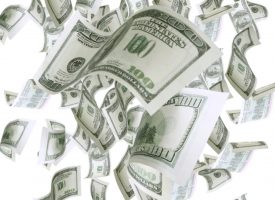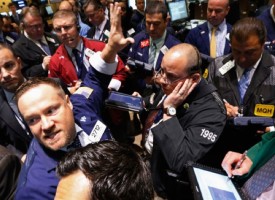On the heels of a 222 point rally in the Dow, legend Rob Arnott discusses the evisceration of the middle class plus Bill Fleckenstein covers gold and more.
By Bill Fleckenstein President Of Fleckenstein Capital
May 10 (King World News) – Overnight markets were higher, though nothing special, but for some reason the SPOOs were relatively giddy, rallying around a little over 0.5%, and through midday today the indices did a bit better, gaining about 0.75%. There was no particular catalyst that I could see, and even though the market was higher, beneath the surface the action was unremarkable.
In the afternoon the indices marched higher still and with 30 minutes to go (when I had to leave) they were over 1% higher. Away from stocks, green paper was once again the flavor of the day versus the yen, though it was mixed for the most part against other colored paper. Oil gained 3%, fixed income was flattish, and the metals added 0.5%, plus or minus.
Fed “Success” Is Just a Hollow-Gram
Now I would like to take a minute to discuss a topic that I touch on and allude to all the time, but rarely confront directly, and that is the role of the Fed (and other central bankers) not just in creating bubbles, but in essence breaking the economy by promoting speculation and hollowing out the middle class through its inflationary and distortionary policies.
 Jim Grant sent Bill Fleckenstein the extraordinary piece by 6 time Graham and Dodd Award winner, Robert Anott (pictured above).
Jim Grant sent Bill Fleckenstein the extraordinary piece by 6 time Graham and Dodd Award winner, Robert Anott (pictured above).
The proximate cause that prompted me to tackle this subject was an email forwarded to me by my friend Jim Grant containing an article by Rob Arnott headlined, “Where’s the Beef?” My interest was piqued as I saw the three key points that he addressed, along with the following commentary, which are included below:
“1. American households, pinched by rising prices at a rate higher than headline inflation, have generally not benefited from the unrelenting stimulus of quantitative easing and zero interest rates, and instead have experienced a decade of zero growth in income and spending power.
“2. The high valuations and low interest rates born of accommodative monetary policy lower forward-looking returns for both the wealthy and the middle class, but the middle class, who must invest today to prepare for retirement tomorrow, suffers relatively more.
“3. When the Fed eventually steps away from overt market interventions, capital market valuations should revert to more normal (i.e., lower) levels, which would bring with them more sensible forward-looking returns.
“The price of beef has been soaring over the past five years — up 80% cumulatively at the end of December 2015 — but you’d never know it by looking at the official U.S. Consumer Price Index (CPI), which is up 7%, or 1.4% a year, over the same five-year span, and therein lies our beef. The developed nations of the world, are supposedly living in a low-inflation environment, at risk of tipping over into the abyss of deflation. That’s what the folks at the U.S. Bureau of Labor Statistics (BLS) tell us. And they should know, right?
“Well, maybe not. Surveys suggest that the average American’s daily experience may be quite different. One-year consumer inflation expectations have been consistently higher than trailing and realized inflation over the last 20 years, and higher than more recent market-based inflation expectations, measured by one-year swap rates. Figure 1 [not shown] shows how this divergence has grown larger since the financial crisis, suggesting the average household might have been feeling even greater pain during the recovery process than has been believed.
“Since 1995, households have expected inflation to be, on average, 3.0%, whereas realized inflation has been around 2.2%, leaving an inflation ‘gap’ of almost 0.8%. What explains this gap? The following is our hypothesis. The four ‘biggies’ for the average American are rent, food, energy, and medical care, in approximately that order. These ‘four horsemen’ have been galloping along at a faster rate than headline CPI. According to the BLS definition, they compose about 60% of the aggregate population’s consumption basket, but for struggling middle-class Americans, it’s closer to 80%. For the working poor, spending on these four categories can stretch to as much as 90% of total spending. Families have definitely been feeling the inflation gap, that difference between headline CPI and inflation in the prices of goods they most frequently consume.”
The Wealth Defect
Later in the body of his article Mr. Arnott really pins the tail on the culprit, that being the Federal Reserve (and other meddling central planning banks):
“Middle-class Americans are struggling, as are middle-class Japanese and Europeans. Easy money, asset purchases, and negative interest rate policies of central banks across the developed world are intended to ignite the ‘animal spirits’ of the private sector. Are they instead stifling economic and wage growth? Are they stimulating asset hoarding and bubbles, which fuel widening gaps between the haves and the have-nots, and feed class resentment? Are they leaving inflationary pressures unchecked and hollowing out opportunities for the middle class? These are provocative suggestions, which go against neo-Keynesian theoretical dogma, but they fit the objective evidence we see all around us. Sometimes common sense trumps theory.
“Former Fed Chairman Ben Bernanke was quite candid in saying that zero interest rates and quantitative easing were intended to create a ‘wealth effect.’ He wanted asset values to rise so the affluent would spend more, so the economy could boom. He achieved the first of these: asset values rose. But who owns assets? The wealthy. What this ‘stimulated’ is a growing gap between the haves and the have-nots: the wealthy got wealthier. That’s redistribution, backwards. Then, in a towering act of hubris and hypocrisy, the central bankers collectively deny they played any role in widening the income and wealth disparity, or in hollowing out the middle class. Ouch. But although the rich began to spend more, the impact on the economy was limited. If the rich mostly buy more assets (i.e., stocks, bonds, real estate, art, collectible cars, rather than ‘new stuff’ that needs to be manufactured), doesn’t that just fuel more bubbles?”
So that is where we are. The central bank actions warp the economy, then they do more of the same in response to the disaster created by the practices, and then it’s “rinse and repeat.” Meanwhile, charlatans like Paul Krugman, Larry Summers, and the merry band of Fed heads act like the only problem we have is that the Fed hasn’t done enough when in fact they have done way too much.
Included below are four questions and answers from the Q&A’s with Bill Fleckenstein.
Bonus Q&A
Question: Hi Bill, this is a question around trading strategy: If one had a chunky position in a sector (miners) that is still significantly underwater does one try and lower the cost basis by adding now when it seems that the sector is back running or does one just sit tight and hope that the existing position gets into the profit column?
Answer from Fleck: “This is impossible to answer, both because it is tricky and everyone has a different financial position. My question is, why did you wait until now to ask that question? I think the metals complex is headed much higher, but given the rally we have had any miner you buy might easily go 15% against you, so you need to be mentally ready for that.”

What About The U.S. Dollar And Its Impact On Gold?
Question: Hi Bill, how does the US Dollar factor into your GOLD thesis, if at all? Does the dollar need to be weak for GOLD to rise? Sure seems like they are trading lock-step at the moment. And I suspect that a global crisis, whether driven by CB error or other forces, will likely push the dollar higher. Thanks!
Answer from Fleck: “Gold is bought everywhere and weak currencies/poor policies the world over are driving gold demand. Thus, the dollar is only a factor, not THE factor.”
Question: Hi Fleck, Jeremy Grantham of GMO LLC has been saying that the top comes when we reach bubble territory in equities. His firm has studied all bubbles and he nailed the 2007/2008 stock bubble and housing bubble as you probably know. His last 5 or 6 quarterly letters to investors have said we need a (2) Sigma overvaluation in the S&P 500 which as of his 2015 4th Quarter letter would now be 2,300 in the S&P 500, a 9.5% rise from the recent 2,100 we hit a few weeks ago. I never thought we would go this high but if we can hit 2,100 twice I suppose 9.5% above that is very possible.
Do your agree with his and his firm’s analysis?
Answer from Fleck: “No, I do not. The top could be in, despite him saying it isn’t.”
Question: Hi Fleck, I have been renting for some time now expecting housing to crack. It would be easier waiting for housing to crack if rents would stop rising. If I was to buy/mortgage a property my monthly payment would now be less then renting. What type of dislocation will we see in housing prices? More severe then 2006 to 2008? Housing prices in some cities are now passed the 2007/08 highs. I enjoy reading M Hanson Real Estate blog – thank you for passing that a long.
Answer from Fleck: “I’m not sure what the other side of this will look like for housing. At some point the bond market will revolt and take rates higher, and that won’t be good for housing at all, and could be devastating, but that may take quite some time. A nasty break in the stock market would also hurt housing, I think. Meanwhile, inflation in housing is roaring away in many areas. If I had been renting I wouldn’t buy a house now unless I found exactly what I wanted and just couldn’t pass it up.”
***To subscribe to Bill Fleckenstein’s fascinating Daily Thoughts CLICK HERE.
***Also just released James Turk – The Price Of Gold Is Being Manhandled On The Comex But Here Is The Surprise CLICK HERE.
To hear the powerful KWN audio interview with Stephen Leeb CLICK HERE OR ON THE IMAGE BELOW.
***To listen to the extraordinary KWN audio interview with former U.S. Treasury official, Dr. Paul Craig Roberts CLICK HERE OR ON THE IMAGE BELOW.
© 2015 by King World News®. All Rights Reserved. This material may not be published, broadcast, rewritten, or redistributed. However, linking directly to the articles is permitted and encouraged.










